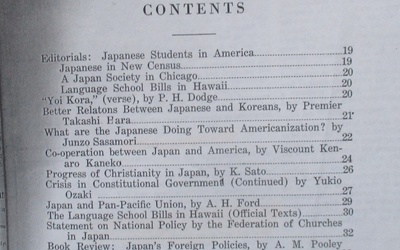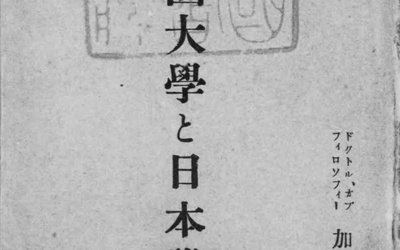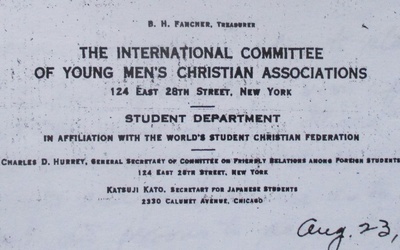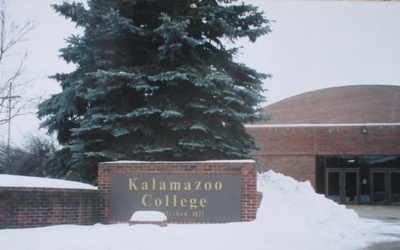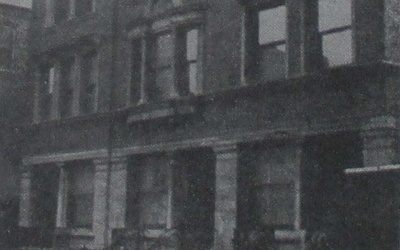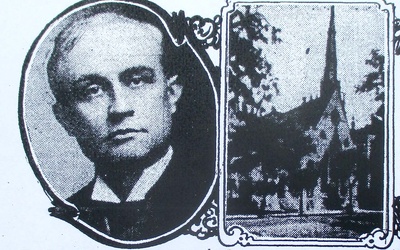Japanese Christians in Chicago
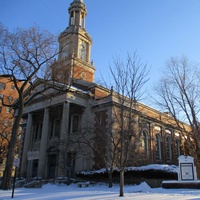
Many Japanese who came to the United States were originally Buddhists. However, Buddhism was not a popular belief among Japanese in Chicago; many of them were Christians. This series will explore the unique background of Japanese Christians in Chicago and shed light on the diversity of Japanese immigrants.
Stories from this series
Katsuji Kato: from Spiritual Savior to Medical Professional - Part 4
March 13, 2022 • Takako Day
Read Part 3 >> We already know that on his trip to Japan in 1917, Kato met with Vice Minister of Education Tadokoro, who told Kato that he hoped the Japanese language was being taught to the Nisei (American-born, second generation Japanese) by their immigrant parents and felt that Japanese language education should be controlled by the Ministry of Foreign Affairs.1 Did Kato actually make contact with the Ministry of Foreign Affairs, and was he asked to publish a new magazine …
Katsuji Kato: from Spiritual Savior to Medical Professional - Part 3
March 6, 2022 • Takako Day
Read Part 2 >> Katsuji Kato as publisher of The Japanese Student and The Japan Review Kato wrote about the history of early Japanese students in the U.S. in the 1860s1 and a bibliography on American-Japanese relations2 because he thought that “therecord of the past must be preserved, by disseminating accurate information concerning the intellectual relations of the United States and Japan, and contribute to the solution of the so-called Japanese problem in America, the creation of the spiritual and idealistic …
Katsuji Kato: from Spiritual Savior to Medical Professional - Part 2
Feb. 27, 2022 • Takako Day
Read Part 1 >> Katsuji Kato as a missionary for Japanese students The Student Volunteer Movement for Foreign Missions originated in New York in 1886, and the Student Volunteer Band for Foreign Missions on campus of University of Chicago “was composed of members of the International Student Volunteer Movement, organized in 1888.”1 In 1895, the Chicago branch of the Student Volunteer Movement for Foreign Missions was housed within the Bible Institute for Home and Foreign Missions of the Chicago Evangelization Society …
Katsuji Kato: from Spiritual Savior to Medical Professional - Part 1
Feb. 20, 2022 • Takako Day
Introduction: Kafu Nagai in Kalamazoo, Michigan Kafu Nagai was the pen name of Sokichi Nagai, the author of Amerika Monogatari, a collection of short stories published in Japan in 1908, that was based on his experiences living in the U.S. for four years. In the book, Kafu wrote that while small groups of elite, educated Japanese with significant financial advantages had come to the U.S. and settled on the East Coast, the majority of the poor Japanese laborers and students …
Chapter 4: Misaki Shimazu and The JYMCI at 747 E. 36th Street
Aug. 8, 2021 • Takako Day
In 1917, Shimazu visited the New York Japanese community to secure funding to purchase the property.1 It was variously reported that Shimazu raised $11,0002 or $18,0003, but these donations came mainly in small amounts from friends of the Central YMCA of Chicago.4 Notably, William J. Parker, the General Secretary of the Central YMCA, donated $4,000 to the JYMCI in May 1918. Parker agreed “to deed the property to such corporation as might be formed or selected by the JYMCI, whenever …
Chapter 3: Misaki Shimazu and the JYMCI
Aug. 1, 2021 • Takako Day
The Japanese YMCA that Shimazu had taken over in 1908 had yet to realize its mission, which was to better the lives of the Japanese immigrants scattered around Chicago, in the spirit of Christianity.1 For the next thirty years, the Japanese YMCA endured many twists and turns, changing its location and name several times, but it eventually became one of the main foundations of Chicago's Japanese community. The Japanese YMCA's thirty year history can be divided into six periods. The …

